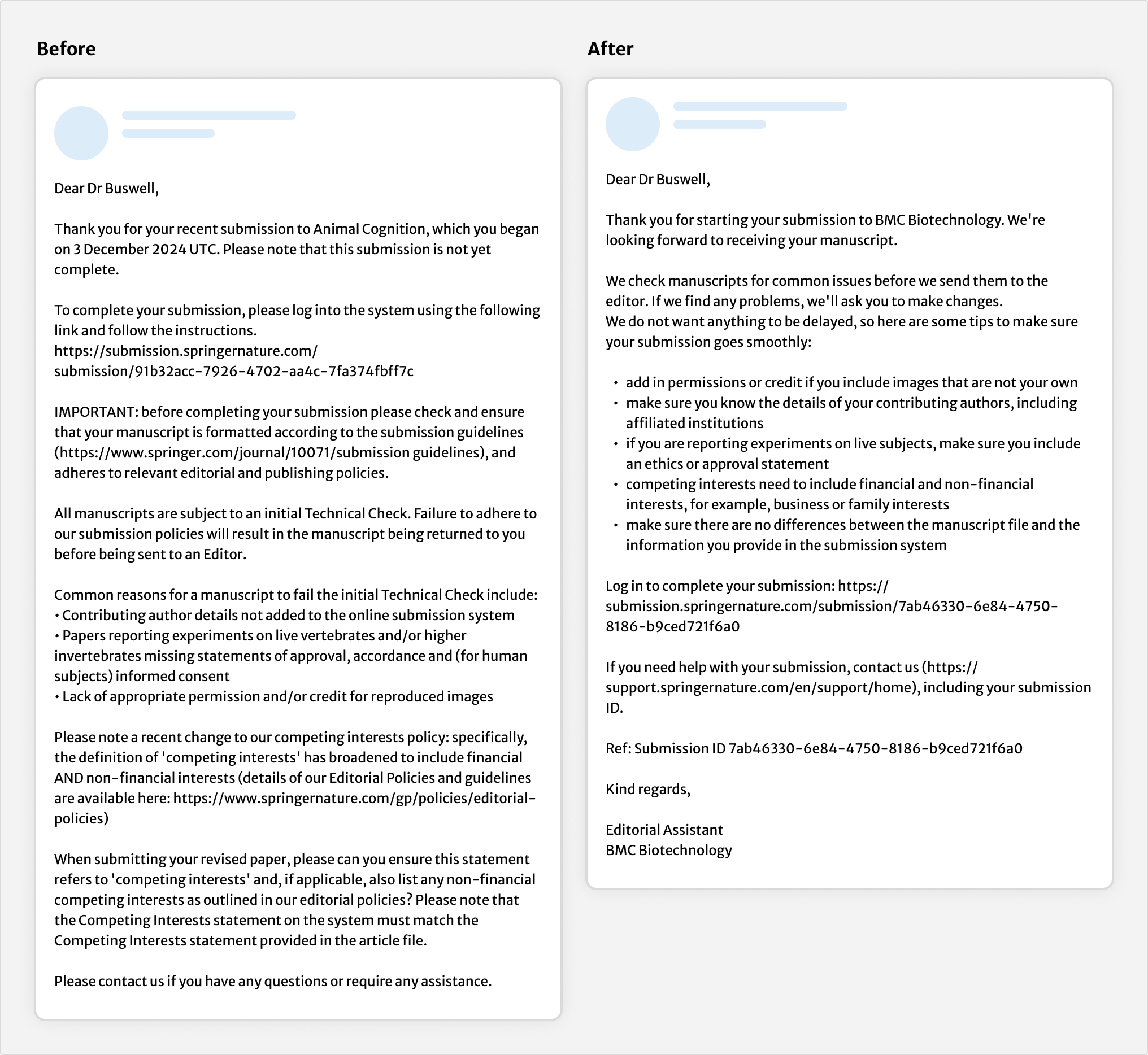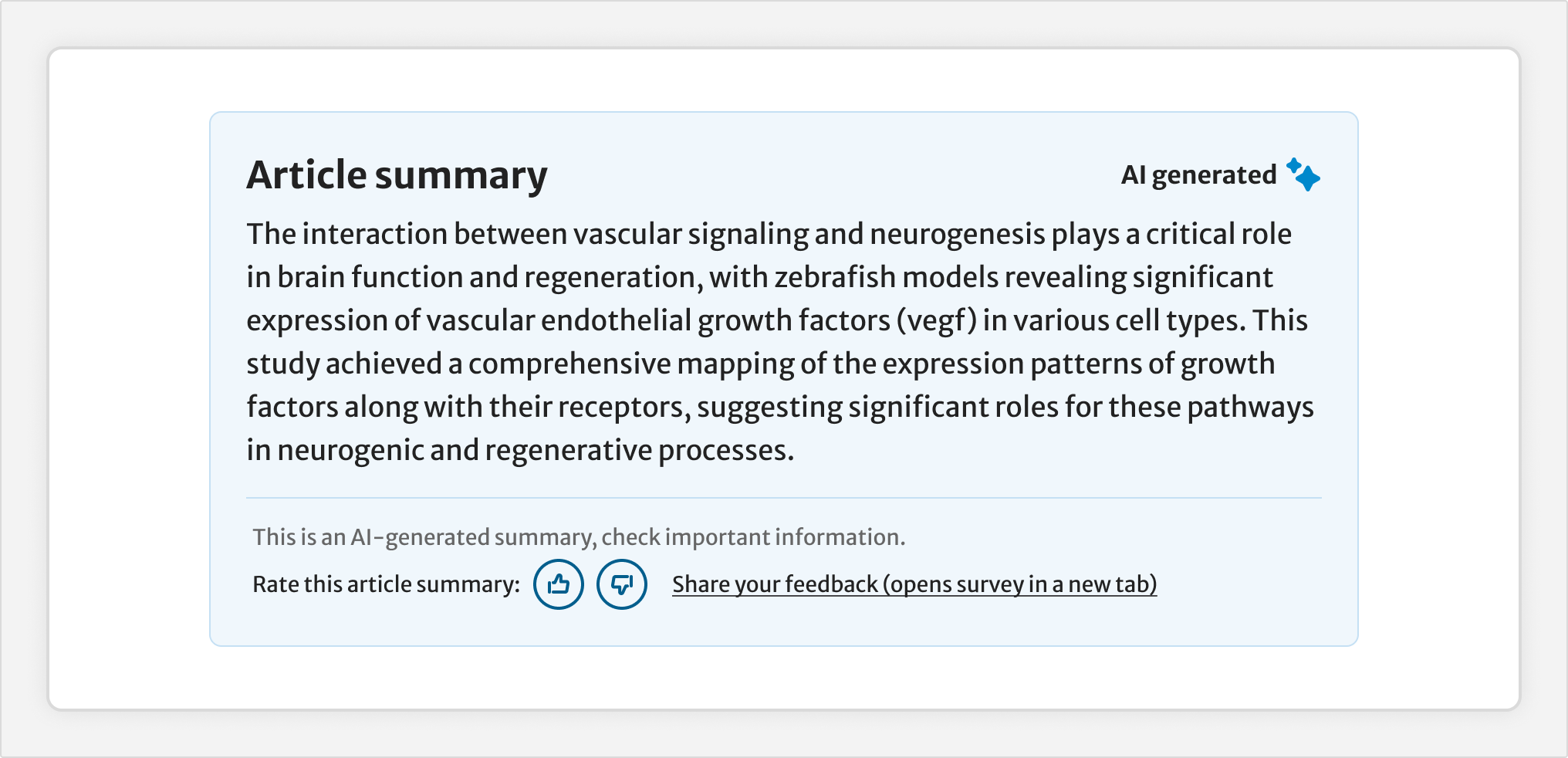Voice and tone
It’s important to think about both voice and tone when we are creating content. The way we say things affects how users perceive us and interact with our services.
Springer Nature’s voice is its personality. It should not change, regardless of what messaging users are consuming.
Tone conveys the emotional context of messaging. This can change, dependent on what the user is interacting with and when.
This guidance explains how to apply Springer Nature's voice and tone to our writing.
This is a work in progress. If you have any feedback, let us know in the Ask UX Content channel on Microsoft Teams.
How to use our voice
Springer Nature brand attributes form the basis of our voice.
Here are the brand attributes, with some examples of how to apply them.
Friendly
Being friendly means:
- write things as you’d say them out loud (for example: ‘We’ve sent you a security code’ instead of ‘You have been sent a security code’)
- use positive contractions like ‘you’ll’ instead of ‘you will’
- do not use negative contractions like ‘don’t’ or ‘won’t’, as they have been shown to confuse some people
- do not confuse friendly with casual. This helps us with our international users. For example, use ‘hello’ instead of ‘hi’, ‘thank you’ instead of ‘thanks’
Case study: Snapp author partial submissions email
In this example, we changed some of the negative words (‘failure’, ‘lack’, ‘no’) to more positive language that makes us appear friendlier.
It’s also important to consider how your users may be feeling when they’re using our products or receive our communications. In this example, we may not know whether their submission will be successful, but there are small changes we can make that make us sound more open and friendlier about receiving their submission.
| Before | After |
|---|---|
| 'Failure to adhere to our submission policies will result in the manuscript being returned to you before being sent to an Editor.' | 'We check manuscripts for common issues before we send them to the editor. If we find any problems, we'll ask you to make changes.' |
| 'Common reasons for a manuscript to fail.' | 'Here are some tips to make sure your submission goes smoothly.' |
| 'Thank you for your recent submission to Discover Oncology. Please note that this submission is not yet complete' | 'Thank you for starting your submission to Discover Oncology. We look forward to receiving your submission' |

Transparent
Being transparent means:
- be specific about what will happen and when (for example, ‘We’ll email you within 24 hours’)
- make costs clear upfront – there should be no unwelcome surprises
- avoid acronyms or explain them the first time you use them
- use the active voice to make clear who is doing what
- explain how hidden processes work, such as manuscript transfers or peer review models, where this will add clarity (not confusion)
Case study: AI-generated article summaries
In this example, we’re making it clear that the article summaries have been created using AI.

Simplified
Write short sentences (maximum 25 words).
Choose words that are easy for everyone to understand.
| Instead of | Use | Example |
|---|---|---|
| Therefore | So | This information is important, so check your details. |
| Require | Need | We need your email address. |
| Receive | Get | If you get a message from us... |
| Utilise | Use | We'll use these details... |
| Ensure | Make sure | You must make sure you complete the form in full. |
| Subsequent | Later | Later editions will be available soon. |
Remember that some of the vocabulary Springer Nature’s users use and are familiar with may be terms that, at first glance, do not appear simple to someone outside of the scientific community. If a word is an industry-wide term, use it but introduce or explain it first. Always be guided by user research on the best words to use. It’s important to maintain consistency.
Examples of industry terms may include:
- corresponding author
- affiliated institution
- open access
- amendments
- revisions
- citations
- version of record
- accesses
- articles in print
- Impact Factor
Confident
What does it mean to be ‘confident’?
- be direct and remove unnecessary filler words
- think of the purpose of the text. If we're trying to encourage users to click through from an email or move forward through our products, we probably do not need to add a lot of information
Remember users only read around 20% of the content on a page, so we want to make it as simple for them as possible.
| Before | After |
|---|---|
| You can find out about You can read our guidelines You can get more information |
Find out about Read our guidelines Get more information |
| If you want to publish subscription, instead of open access, there will be an option to do that in the following steps. | Choose if you want to publish Open Access. |
| Provide details to help us check whether your article processing charge (APC) is covered by your institution or a journal partner. | Confirm your affiliation |
Please, thank you and sorry
Use 'please' and ‘thank you’ sparingly, they can come across as insincere or otherwise out of context and often just get in the way.
Say sorry when we’ve done something wrong and, where possible, tell the user what they can do next. Sorry can sound insincere if overused, so say it once and move on. We do not need to say sorry if the problem is due to user error.
| Do | Do not |
|---|---|
| 'Please fill in this survey’. (We’re asking for a favour)' | 'Please enter your details’. (This is just a necessary step) |
| 'Sorry, this service is currently unavailable. Try again in a few minutes.' (It’s our fault) | ‘Sorry, you’ve entered an invalid password’. (It’s the user’s error) |
How to use tone
We want to sound human and empathetic. Using empathy in writing means being sensitive to the user’s context, particularly in stressful moments.
When it comes to error messaging, payments and transactions, time-based interactions, clarity always comes first.
We will describe how to apply tone in future guide updates.
Using tone and voice when writing for a global audience
We use British English across Springer Nature’s products and services. (You may find examples of US English in legacy content, some marketing emails and some scholarly content).
Our research shows only 27% of respondents have English as their first language. 35% use some kind of adaptation to support their use of the internet, with translation tools being the most used.
We’ll look into internationalisation and localisation strategies separate to this guidance.
Phrasal verbs
Phrasal verbs describe when you join a verb to another word.
For example, adding the verb ‘take’ to other words such as ‘take up’, ‘take off’, ‘take in’, ‘take over’, and ‘take on’. Each of these have a different meaning and are context dependent.
These are difficult to translate to an international audience and should be avoided.
Idioms and colloquialisms
We should also avoid idioms or colloquial words, as they can be confusing.
| Instead of | Use | Example |
|---|---|---|
| Like | For example | We will check if you have any deals available to you to pay the APC, for example through your institution. |
| Once | After, when | After you've submitted your manuscript it will be sent for technical checks. |
| Take into account | Consider | When inviting reviewers to a paper, consider their suitability for reviewing the topic. |
| Other than | Apart from | Anyone apart from the authors must ask for permission. |
| Straight away | Immediately | We'll send you a security code immediately. |
Help improve this page
If you’ve got a question, idea or suggestion about how to improve these guidelines, post in the Ask UX Content Teams channel.
